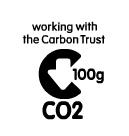 You used to be able to count only the calories in your snacks owing to diet-friendly product labeling, but soon it might be just as easy go on a carbon diet—that is, if you live in the United Kingdom. The Carbon Trust in the UK recently announced the launch of a new product labeling method, which the Independent called “a green equivalent to the Fairtrade label.” The logo, depicting a black ‘C’ wrapped around a white arrow, will document the carbon footprint of the labeled commodity. To be eligible to use the label, The Carbon Trust will require companies to do extensive analyses of their products’ carbon footprints and make a commitment to reducing this footprint over a period of two years. This is just one more instance of the UK leaping ahead in the race to reduce carbon emissions.
You used to be able to count only the calories in your snacks owing to diet-friendly product labeling, but soon it might be just as easy go on a carbon diet—that is, if you live in the United Kingdom. The Carbon Trust in the UK recently announced the launch of a new product labeling method, which the Independent called “a green equivalent to the Fairtrade label.” The logo, depicting a black ‘C’ wrapped around a white arrow, will document the carbon footprint of the labeled commodity. To be eligible to use the label, The Carbon Trust will require companies to do extensive analyses of their products’ carbon footprints and make a commitment to reducing this footprint over a period of two years. This is just one more instance of the UK leaping ahead in the race to reduce carbon emissions.
Three British companies have committed to pioneering the label on their products, which serves as a brilliant—but currently untested—marketing strategy with the rise of eco-chic. The Fairtrade label has been doing remarkably well in the UK, as this article on Treehugger notes, which would be incentive enough for a company to hedge its bets on the success of the new carbon label. The first company to launch the label, Walkers, managed to cut the carbon footprint of their soon-to-be-labeled cheese and onion crisps by one-third after doing a thorough carbon analysis. Boots Organics shampoo and Innocent smoothies will be the other two labeling pioneers.
If you aren’t lucky enough to live in a place as trailblazing as the UK, you won’t be able to discover the carbon released during the production of your organic shampoo, but you can still keep an eye on your own carbon footprint with helpful online tools here and here.
—Rose Miller











